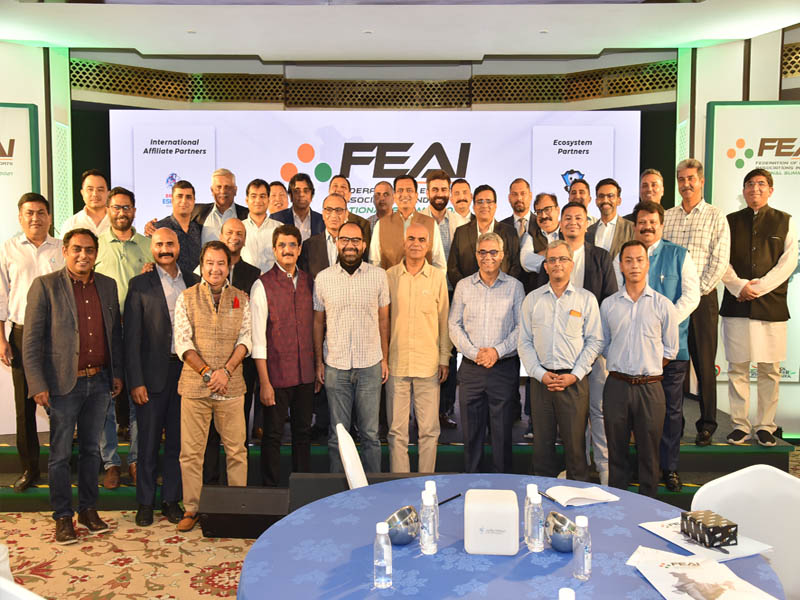October 22, 2021, New Delhi: Esport despite being a new addition to the global Olympic agenda, has gained massive growth across developers and talent due to the sheer potential and digital penetration India has witnessed over the last few years. The narrative is developing quickly across the country and hence the need to bring together all stakeholders on a common platform to chart the course ahead was a much welcome development. The Federation of Electronic Ssports Associations India (FEAI), a representation of 26 state associations of India, organised a national summit on 21st October bringing together key members of the industry along with sporting legends, esport talent and representation from across key states to discuss the way forward for the sector to come together and structure a sustainable growth. Today, India has 150,000 players and approximately 60,000 teams. This number is estimated to reach over 1.5 million by FY 2025.
Appearing as a guest of honour at the FEAI National Summit, Olympic Bronze medalist and Khel Ratna awardee Shri Gagan Narang, President, Telegu Esports Association, said, “I am delighted to be a part of this landmark day wherein we are laying the foundation for esports in India. I view this occasion as a celebration of human spirit and the spirit of Olympisim that the FEAI aims to promote. It will be important to imbibe certain ethics and promote the values of fair play and honesty. At the same time, the health of athletes must be prioritized. Excellence in performance, character in education, fun and joy, teamwork, dedication, respect for rules and laws, respect for self and other participants should form the core values of the FEAI. The athletes should always take centre stage; we must develop a framework in which the whole federation should revolve around the athletes, and not the other way round.”
Padma Shri and former Indian Men’s Football team captain Bhaichung Bhutia, President, Teesta Esports Association, also echoed the sentiments of his fellow guest of honor. Bhutia said, “I am immensely happy to be part of the FEAI’s inauguration today. We are all aware of the importance of growing digitalization in the present scenario, which has been a key factor in the massive popularity and growing traction for esports in the world. With esports now officially a part of the Asian Games and hopefully the Olympics in the years to come, the nation will be pinning hopes on esports athletes to compete at these prestigious events and win medals for India. I am confident that the establishment of the federation will provide young and aspiring esports athletes the right ecosystem to develop their talent and give them a structure that will enable them to compete for laurels and achievements with the world.”
Also participating at the summit was the British Esports Association as an ‘international alliance partner’ of the FEAI. Dave Martin, Strategy Head, BEA said, ”lndia is an important chapter on the global esports story. Like the BEA, India should also endeavour to have a strong culture of making esports a cultural engagement with a strong grassroots outlook.”
Beyond traditional sport, the difference in the stakeholder mix when it comes to esport is the publishers playing a critical role in the mix. On the other hand, esport does need an administrative structure keeping in mind robust local and international competitive tournaments and the growth of talent which needs to be streamlined. So far the industry has been highly fragmented leaving structure and future prospects open to interpretation. Often the line blurs between esport and gaming. This needs to change.
Speaking at the inaugural function, Shri Vaibhav Dange, Founding Director, FEAI & President, Maratha Esports Association said, “India is poised to make headway in esports and reap great benefits from this pursuit, both in terms of the Indian youth’s participation in esports and their willingness to create their own identity in the global esports arena, as well as the overall development of esports as an industry as a whole. Our first endeavour is to work with all involved stakeholders to put together a draft policy which highlights the right definition of esports, how it is differentiated from online gaming, what is the regulatory framework that is needed and how athletes need to be ranked and protected in the long term. FEAI endeavours to invite the industry to formulate this policy recommendation.”
Unlike online games, esport embodies the digital manifestation of traditional sport. This was recently demonstrated at the Olympic Virtual Series during the recently concluded Tokyo 2020 Olympic Games held earlier this year. The esports games are monitored and requires the same skills as many traditional sport like hand-eye coordination, strategy development and a deep knowledge of the sport and its rules of play. Like traditional sport, esport requires time to train and practice.
The most critical tournaments being those held at the Asian Games as a medal sport and South Asian Games apart from the next edition of the Olympics as well. Indian developers have the task ahead to develop more customised games suited to esports tournaments and talent.
These digital versions of traditional sport are far more accessible and form a critical stepping stone in grassroots development of any sport as well. With growing uncertainty with changing conditions around the pandemic, esports can act as an essential training conduit across novice and professional athletes.
Esport talent in general is at an age between 14-24 years old. This millennial power that drives our Indian talent ecosystem has grown exponentially. The link back of this demographic to digital adoption in India is evident.


